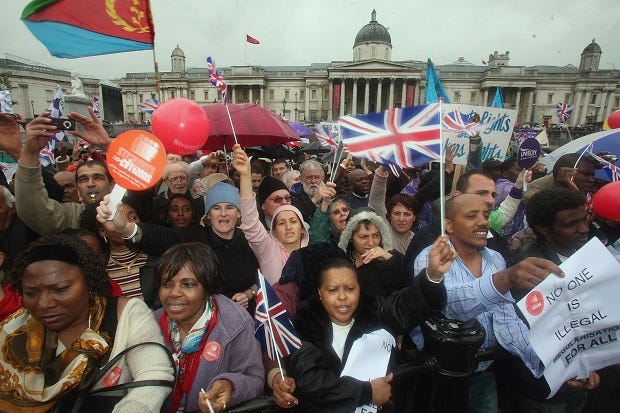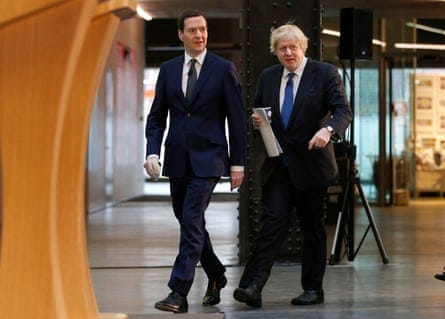Line Go Up PART 2

How the elites benefit from mass immigration: part 2

Proposition 3
Migrant labour reduces labour costs
Immigration is advantageous to those in industry that benefit by importing low-skilled, low-wage labour onto our shores. Immigration increases the size of the workforce and increases the government’s tax base as well. Immigration puts downward pressure on wages and benefits for workers, returning higher profits for CEOs as a result. This also allows corporations to keep prices low for the consumer as well.
Labour shortages are often cited as a primary reason why we need immigration whilst bringing in migrant labour boosts the working-age population too.
Immigration = lower wages and higher profits + more workers
Within the wider debate on immigration, whether immigration actually depresses wages or not (and if so to what extent) has become a contentious issue in itself. Many reports and studies have concluded that immigration has little or no impact on the wages of British-born workers which I find difficult to believe. I maintain that labour, like everything else, simply follows the principle of marginal utility in that the more of something there is the cheaper it will invariably be. In the past, Boris Johnson [1] and Theresa May [2] have both publicly addressed the relationship between increased migration and lower wages for British workers. A never-ending conveyor belt of low-skilled, low-wage workers means that the balance of power will always lie with the employers. Ultimately, for businesses and corporations, open borders mean higher profits. Migrants are densest in areas of the economy which rely on low-skilled labour (construction, nursing and hospitality to name a few) and low-wage workers in these sectors suffer the most from immigration, while workers in other areas of the economy stand to benefit from immigration, it is claimed.[3]
A study by the Migration Advisory Committee from 2018 found that immigration does reduce the wages of lower-skilled workers while increasing those of higher-skilled workers.[4] A study by Migration Watch in 2014 concluded that immigration “leads to increased taxable profits” which accrue to the shareholders of companies employing migrant labour.[5] Meanwhile, the George W. Bush Institute confesses that the benefits of immigration “go primarily to the owners of capital, which includes business and land-owners and investors.”[6] Another study, by University College London, demonstrates that earnings in the lowest quartile of wages for companies that employ migrant workers resulted in wages declining by 4-5% compared with companies in the same sectors that do not hire migrant workers.[7]
Of course, wages are not the only thing to consider, there is also the question of benefits and working conditions too. Sick pay, annual leave, welfare benefits, maternity leave and other benefits that migrant workers do not receive all add up to a fairly substantial saving as well.

The gig economy, sometimes referred to as the platform economy, is a relatively recent innovation that relies heavily on migrant labour. The gig economy consists of familiar names like Uber, Deliveroo and Airbnb but also Amazon and others too. Marked by undetermined working hours, no contracts and fluctuating incomes the small body of research on this concludes that the gig economy relies on a continuous influx of migrants to sustain these markets. A study published in the journal Work, Employment and Society even goes as far as to say that migrant labour is built into the actual working model of these companies.[8] One does not wish to get conspiratorial but, broadly speaking, the gig economy took off in the UK at roughly the same time the migrant crisis started. Research suggests that across Europe migrant workers navigate between the gig economy and the wider, informal underground economy as a means of sustaining themselves; doing low-skilled jobs that require little English greatly assisted by innovations in technology. Some reports suggest that half the workers in the platform economy earn below the minimum wage in the UK, this will be welcomed by the likes of Uber, Amazon and others I‘m sure who will see these gains translate into higher profits.[9]
Industries such as construction, hospitality and the service industry all favour immigration and lobby the British government for policies that are in their best interests and these industries are among the biggest donors to the Conservative Party. These sectors of the economy are the ones that have the highest density of low-wage workers so it stands to reason that they would be in favour of more migration. After finance, construction and property businesses donate the most to the Conservatives; the Wates Group and JCB Construction have been significant donors to the party, contributing £430,000 and £8.1m between 2007 and 2017.[10] Most of Boris Johnson’s biggest backers in 2019 were from finance and property. Jamie Reuben, co-owner of the Reuben Brothers property empire, gave around £700,000 to the Tory party.[11] The single biggest individual donor in the Johnson era was Malcolm Healey – the retail tycoon whose company owns Wren Kitchens; Healey donated £2.3m to the Conservatives between 2017 and 2021.[12] This might all be incidental but industries that stand to gain the most from mass immigration seem to donate substantial sums to the Tory party. And how can we forget the Uber files scandal of 2022; a global investigation revealing how Uber broke the law, duped police and regulators, and secretly lobbied governments across the world, including former prime minister Boris Johnson and former chancellor George Osborne, who Uber pressured to dilute minicab reforms in 2015.

It is an excuse to say we need immigrants to fill labour shortages. Simply put, we have labour shortages because companies refuse to pay higher wages.[13] If wages and working conditions were better there would be fewer shortages as British workers would be more willing to fill these positions and immigration would not enter into the equation. Companies that hire migrant workers know that were they to hire native-born workers this would negatively impact their profits. Furthermore, hiring foreign workers absolves them from having to invest in technology and training, one of the primary reasons why the UK labour force has an ongoing skills gap, the skills gap being yet another reason given for why we need immigrant labour. This is a vicious circle: addressing labour shortages with migrant labour keeps wages in these sectors low and acts as a barrier to entry for British-born workers thus requiring yet more migrant labour to meet the shortages.
Proposition 4
Immigration means weaker opposition for the elites
Another consequence of immigration is that the more diverse a workforce is the lower the levels of union participation and the weaker unions become as a result, which is also a big benefit to both industry elites and the government. Unions advocate and lobby the government for better pay and conditions for workers. They often plan and organise strikes which cause severe disruptions for the government, especially in transport, education healthcare and emergency services.
Immigration = weaker opposition for the elites
Historically, organised labour movements and the unions behind them have been a consistent problem for the elites for decades, often turning militant and being a catalyst for political change. The UK saw its fair share of union-led disruptions in the 80s and had bitter and fierce conflicts with Thatcher’s Conservative government.
Unions in industry and manufacturing have always opposed immigration as immigration disadvantages workers in these areas more so than they do workers in other sectors of the economy. By accepting lower wages, immigrants bypass traditional union collective bargaining for better pay and conditions, undercutting union solidarity and influence by doing so.
Now, only 1 in every 20 workers is part of a union across the developed world (traditionally this ratio has been much lower) and according to Jeff Rubin closures of unionised manufacturing plants are double that of non-unionised plants.[14] Rubin goes on to explain that countries like China and Mexico are desirable destinations for corporations precisely because unions either do not exist or, in the few cases that they do (primarily in Mexico), they have very little organisational and representative power. In the UK, union membership has declined precipitously in recent decades and now currently stands at 6.25m members according to the government’s figures.[15] At its peak, in the 1970s union membership stood at around 13 million.[16] *
According to the Economic and Policy Institute, the steady erosion of collective bargaining power has led to lower wages for workers. Less union participation simply means less collective bargaining power as the group is numerically smaller, this in turn leads to lower wages for workers and higher profits for companies at the end of this cycle. Ironically, the slow and steady collapse of collective bargaining has led to lower wages for both union and nonunionised labour.[17] The structural and institutional weakening of unions is of equal benefit to both the government and to corporations as well.
Other points of consideration
A higher GDP allows the government to borrow more
Having a higher GDP allows the government to borrow more, allowing for a more expansive monetary policy (monetary inflation, basically money printing) and more leverage for debt financing (bonds, certificates of deposit and other financial instruments that bring in money from abroad) and thus higher deficit spending too. Simply put, the government can borrow more and thus can spend more when GDP increases. This is perhaps why the trend lines for rising immigration and rising debt are very similar.
The more people we have in the UK the more this raises GDP. This tells investors that their potential investment in sterling-denominated debt is a safe one. It also needs to be pointed out that the government’s tax base grows as well which is particularly relevant when you consider the enormous amount of debt the UK currently has as higher interest rates mean more money required for debt service payments so having a bigger tax base helps in this regard.
Immigration = enables the government to borrow and spend more + increased tax base

The Immigration Complex
Another point to consider that is often overlooked is how immigration into the UK is supported by an entire industry; with companies in surveillance, detention centres, IT, visa processing and aviation all benefiting tremendously from mass immigration into the UK.
The British government employs VFS Global - a Dubai-based company - to handle its visa applications. The firm Sopra Steria handles the processing of biometric data for visa processing, winning a contract from the government for £91 billion. The British government itself benefits tremendously from the immigration industry, having earned £1.6 billion alone from overseas visa applications.[18] Serco and Mitie, who run immigration detention centres in the UK, and G4S, a private security firm, are all influential players in Britain’s immigration industry.[19] Serco, G4S and Mitie have faced accusations and legal cases relating to abuse, discrimination, corruption and other charges too. A 2020 study from Birkbeck College, London, claims that billions of taxpayer pounds get redirected to these companies whilst also claiming that the running costs of these companies are greatly reduced by employment schemes that see them pay detainees a mere £1 per hour for their labour.[20] The independent UK website The Ferret, claims that at least 70 firms have government contracts linked to immigration-related services.[21] The Ferret has compiled a fairly extensive list of both British and international companies that have all received highly lucrative government contracts for immigration-related services: among them include Deloitte Digital (for software), Experian (for the provision of various financial services) as well as companies from Israel, the United States and Germany to add to those mentioned above.[22]
If immigration goes down then so do the profits of many of these companies. The immigration complex needs immigration – both legal and illegal - to survive.
Conclusion
Despite the majority of the British public being against mass immigration it continues to this day, largely because there are many beneficiaries under the policy of open-door, blanket mass immigration into the UK. The government, those in high finance the city, the various corporations who facilitate the immigration process, as well as most of the platform economy all stand to lose out if the wishes of the general public are granted and immigration is reduced.
Our elites like immigration because, at the end of the day, it is good for them. It raises GDP by increasing aggregate demand with more money being spent in the economy, it pushes up asset prices like property as well as the stock market more generally and it allows the government to borrow and spend more. For industry it means cheaper labour and thus higher profits. The gig economy is heavily reliant on migrant labour and the corporations that enable the immigration process are too.
I titled this series ‘Line Go Up’ because this title has several different meanings: it refers not just to immigration but also to GDP, government debt, the stock market, corporate profits, the growth of the gig economy and a lot more. At current levels, immigration is simply unsustainable and one wonders what will become of the country if it continues at this rate, if it does whether the line goes up or down will be the least of our problems.